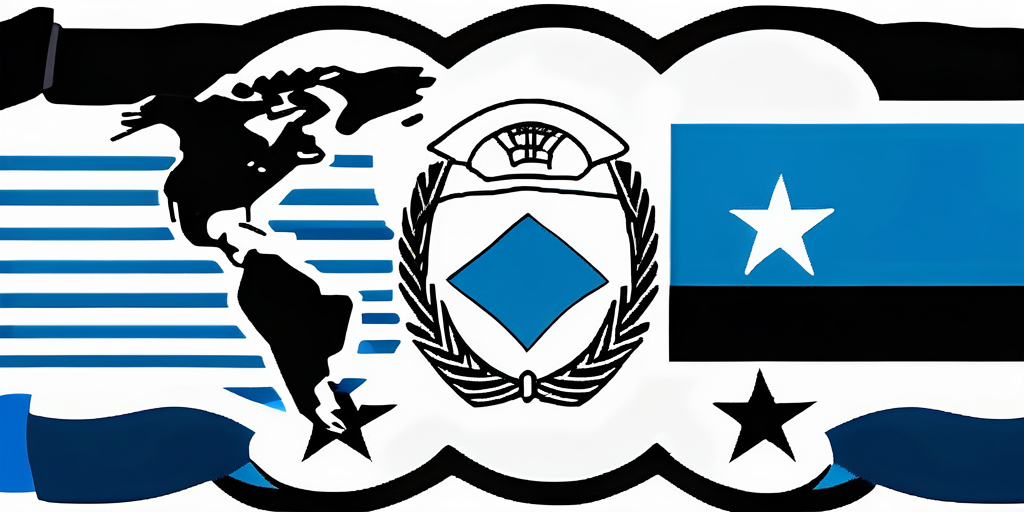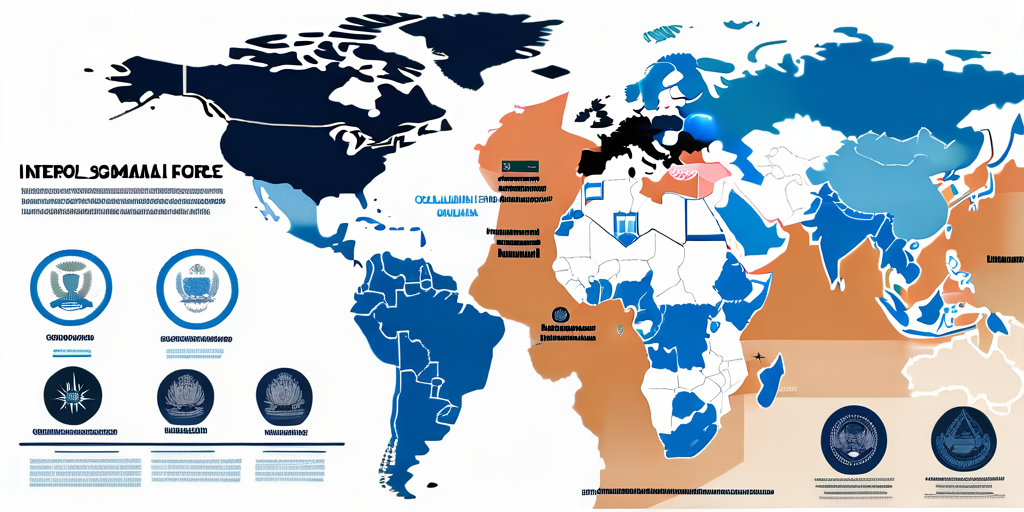In recent years, Somalia’s connection to Interpol, the international police organization, has become increasingly significant. This collaboration plays a pivotal role in addressing various security challenges faced by Somalia, as well as enhancing regional and global security efforts. Understanding Interpol’s role in Somalia is crucial to comprehending the complexities and dynamics of this partnership and its implications for Somali security.
Understanding Interpol’s Role in Somalia
Somalia has a long and complex history with Interpol. To fully grasp the significance of their current collaboration, it is essential to explore the history of Interpol in Somalia and gain insight into their current operations.

The History of Interpol in Somalia
Interpol began its involvement in Somalia in the early 1990s, during a period of significant instability and conflict. The organization aimed to assist the Somali authorities in combating transnational crime, terrorism, and piracy. Despite the challenges posed by the political and security situation, efforts were made to establish a foundation for cooperation between Interpol and Somali law enforcement agencies.
During this time, Interpol faced numerous obstacles in their mission to support Somalia. The lack of a centralized government and the presence of multiple factions made it difficult to establish effective communication channels and coordinate joint operations. However, Interpol persevered, recognizing the importance of addressing the root causes of crime and instability in Somalia.
Over time, Interpol’s partnership with Somalia has evolved, adapting to changing circumstances and emerging security threats. This ongoing collaboration has been vital in addressing various criminal activities, including human trafficking, drug smuggling, and money laundering. Interpol’s commitment to assisting Somalia in building a safer and more secure future has remained unwavering.
Interpol’s Current Operations in Somalia
Today, Interpol’s operations in Somalia are multifaceted and encompass a wide range of activities. Through its National Central Bureau (NCB) in Mogadishu, the organization provides intelligence sharing, investigative support, and coordination of cross-border operations.
Interpol’s databases, such as the Stolen and Lost Travel Documents (SLTD) database, play a crucial role in deterring terrorists, criminals, and individuals involved in illicit activities from entering or leaving the country. Somali law enforcement agencies have access to these databases, facilitating the identification and apprehension of criminals.
Moreover, Interpol’s presence in Somalia extends beyond intelligence sharing and database access. The organization actively engages in capacity building, training, and equipping law enforcement officers. Recognizing the importance of specialized expertise, Interpol focuses on enhancing the capabilities of Somali law enforcement personnel in various areas, such as counter-terrorism and cybercrime investigations.
Through targeted training programs, Interpol equips Somali law enforcement officers with the necessary skills and knowledge to effectively combat evolving criminal threats. This investment in human capital ensures that Somalia’s law enforcement agencies are equipped to tackle the challenges of the modern world.
In conclusion, Interpol’s role in Somalia is not limited to a mere collaboration; it is a testament to their commitment to promoting peace, security, and justice. By understanding the history of Interpol in Somalia and their current operations, we can appreciate the significant impact they have had and continue to have in the country’s fight against transnational crime.
The Impact of Interpol on Somali Security
The collaboration between Interpol and Somali authorities has had a significant impact on the overall security situation in Somalia. By leveraging Interpol’s resources, expertise, and global network, the Somali authorities have made considerable strides in addressing security challenges and reducing crime.
Interpol’s Contribution to Crime Reduction
Interpol’s contribution to crime reduction in Somalia cannot be overstated. By sharing intelligence, coordinating operations, and assisting in investigations, Interpol has helped disrupt and dismantle criminal networks involved in various illicit activities.
For instance, in recent years, Interpol’s support has been instrumental in combating piracy off the coast of Somalia. Through intelligence sharing and joint operations, the organization has facilitated the arrest and prosecution of individuals involved in maritime piracy, thereby safeguarding regional trade routes and ensuring the safety of maritime activities.
Challenges Faced by Interpol in Somalia
Despite the significant progress achieved, Interpol faces several challenges in its operations in Somalia. The persistent political instability, weak institutional capacity, and limited resources pose obstacles to the effective implementation of collaborative initiatives.
Additionally, Somalia’s geographical location and porous borders contribute to the complexity of addressing transnational crime. The lack of comprehensive border control mechanisms and widespread corruption create opportunities for criminal networks to operate with relative impunity.
Interpol’s Collaboration with Somali Authorities
Interpol’s collaboration with Somali authorities extends beyond intelligence sharing and operational support. Building relationships with local law enforcement agencies and investing in training and capacity building initiatives are essential components of this partnership.
Building Relationships with Local Law Enforcement
To foster effective collaboration, Interpol works closely with Somali law enforcement agencies at all levels, including the federal, regional, and local levels. Regular meetings, joint trainings, and information exchanges are conducted to enhance cooperation, facilitate the sharing of best practices, and develop a mutual understanding of the challenges faced.
Strong relationships between Interpol and Somali law enforcement agencies foster trust, facilitate the flow of information, and ensure a coordinated response to emerging security threats.
Training and Capacity Building Initiatives
Recognizing the importance of sustainable security solutions, Interpol invests in training and capacity building initiatives for Somali law enforcement personnel. These initiatives encompass a wide range of specialized areas, including counter-terrorism, organized crime investigations, and forensic techniques.
Training programs are tailored to the specific needs and challenges faced by Somali law enforcement agencies. They aim to equip officers with the necessary skills, knowledge, and tools to effectively combat crime and enhance overall security.
Future Prospects for Interpol in Somalia
The future prospects for Interpol in Somalia are promising, but challenges remain. Ongoing collaboration, planned initiatives, and potential implications for Somali security must be considered.
Planned Initiatives and Operations
Interpol continues to work closely with Somali authorities to develop and implement planned initiatives. These initiatives focus on addressing emerging security challenges, such as cyber threats, human trafficking, and terrorism.
Furthermore, Interpol aims to expand its presence and strengthen its operations within Somalia. To achieve this, the organization seeks to increase its partnerships with regional and international stakeholders, leveraging collective efforts to enhance security and stability in the region.
Potential Implications for Somali Security
The collaboration between Interpol and Somali authorities holds significant implications for Somali security and the overall stability of the region. By strengthening law enforcement capabilities, improving intelligence sharing, and coordinating efforts to combat transnational crime, the partnership enhances Somalia’s ability to address security challenges effectively.
Improved security in Somalia has far-reaching implications, including economic development, political stability, and social cohesion. Furthermore, an enhanced security environment contributes to the overall stability of the Horn of Africa, addressing regional security challenges and fostering regional cooperation.
In conclusion, Somalia’s Interpol connection plays a vital role in addressing security challenges and enhancing regional and global security efforts. Through collaboration, intelligence sharing, capacity building initiatives, and operational support, Interpol’s partnership with Somali authorities has yielded tangible results, contributing to crime reduction, resilience against terrorism, and enhanced overall security. The future prospects for Interpol in Somalia are promising, with planned initiatives and potential implications for Somali security. Continued collaboration and investment in this partnership will further strengthen Somalia’s security landscape and foster regional stability.


